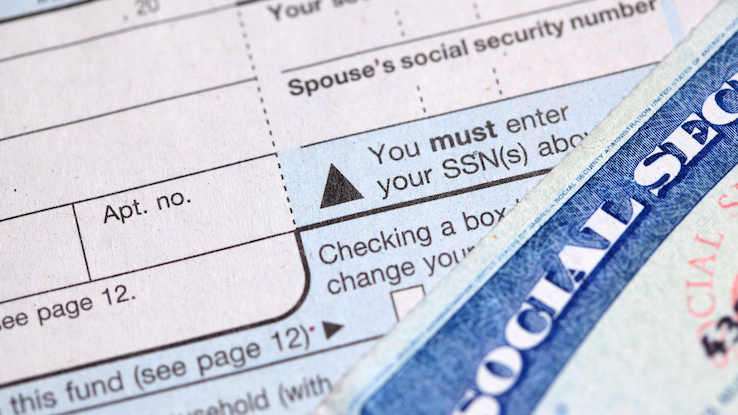
Your Social Security number is one of the most important and personal pieces of information you have. One of these unique nine-digit numbers is given to every American at birth or at the time they obtain U.S. citizenship. It’s a vital detail that can help you keep track of your earnings, open new lines of credit and use as identification, among many other activities.
Because it’s so personal and tied specifically to you, however, your Social Security number isn’t something you want just anyone getting access to. After obtaining it, someone could use it to impersonate you, steal your identity or enter into financial transactions that create unnecessary hardship for you.
Sometimes, despite your best efforts at keeping your Social Security number (SSN) safe, it might end up in the wrong hands. If you suspect your SSN has been stolen, it’s vital to take the right steps to protect yourself. The following tips can help you get back on track if you’re dealing with a stolen number or similar identity-theft situation.
Signs That Your Social Security Number Has Been Stolen
There are a few red flags to watch for that can indicate someone’s gotten ahold of your SSN and used it. One sign is that your credit score drops without any plausible explanation. Another is that your bank account has mysterious charges or withdrawals. You also may see suspicious emails or mail arrive at your home.
It’s important to take note of these occurrences and investigate them further, not write them off. You may find it helpful to sign up with a credit-monitoring program offered by one of the main credit bureaus to keep tabs on your score. Also, try to get into the habit of regularly checking your bank balances online and reviewing new transactions to ensure you were the one who made them.
Another popular scam happens when thieves steal someone’s SSN and use it to get a job or receive a paycheck. If this happens, you may start to receive mailed notices from the Internal Revenue Service (IRS). It’s important to note that the IRS will never call you. If you get a phone call from someone claiming to be from the IRS, this is likely a scam, and you shouldn’t divulge any personal information. You may, however, start to receive calls from credit agencies or debt collectors notifying you about accounts that are past due, and these may be legitimate calls. These fraudulent accounts may have been opened in your name without your knowledge.
If you’ve confirmed with the IRS or a credit bureau that someone has used your SSN fraudulently, the following steps can help you protect yourself.
Contact the Social Security Administration to File Fraud and Incident Reports

To kick off the identity-theft recovery process, you need to contact the Social Security Administration to report the fraud and begin creating a record of your identity theft. The Social Security Administration may direct you to the Federal Trade Commission’s (FTC) reporting website. You can visit the site directly at identitytheft.org.
On the website, start by filing fraud and incident reports, which will include some basic information about the incident and what happened. From there, the site offers suggestions about what to do next. Depending on the specifics of your situation, you may need to report the theft to a landlord or credit card company, and you might also need to get a new SSN altogether. The FTC’s website offers a step-by-step guide that includes links to file reports and initiate the recovery process.
File a Police Report
To begin documenting your identity theft, the Social Security Administration may want you to provide a record of the theft that it can later use while investigating your case. You can file a police report in your local community to legally document the crimes of fraud. This is also used later if any legal action is taken. Keep in mind that your local police department may not investigate the crime. However, you’ll need a legal record to help reclaim your identity or get a new Social Security number.
Apply for a Replacement Social Security Number
The Social Security Administration allows you to receive a new SSN under certain circumstances. One example is if you’re in immediate danger or being threatened in a domestic abuse situation. Another is if your SSN has been stolen.
To begin the process of obtaining a new SSN through the Social Security Administration, you’ll need to provide a written statement outlining what happened to you and why you need a new number. In addition to your statement, you’ll also need to provide legal documents backing up your statements; these can include your police report.
You will also need to fill out the SS-5 form. This is the same form you or your parents filled out when you were born or that you filled out when you became a citizen. This form includes a series of questions about your previous SSN filing. You’ll note on this form if you previously filed when you became a citizen or provide the names of your parents, who filed on your behalf.
In addition, you also need to provide documentation showing your U.S. citizenship, age, legal residence, identity and existing SSN. If you’ve ever changed your name, you’ll need to submit documentation of this. If you changed your name when you got married, for example, you could submit your marriage license to satisfy this requirement.
Call the IRS Protection Unit and Check on Tax Filings

In addition to contacting and filing documentation with the Social Security Administration, you also want to notify the IRS about the fraud. This is an important step in preventing anyone from filing a false tax return in your name to claim your tax refund. You can check to see if anyone has already used your name to file a fraudulent tax return on the IRS website by checking your transcripts. In addition to using the tool on the IRS website, you can also call the IRS at 1-800-908-9946 or fill out an IRS 4506-T form to get a copy of your tax filing transcripts in the mail.
Set Up Fraud Alerts
As soon as you learn that identity theft has happened to you, you’ll want to set up fraud alerts through your bank and credit card companies. This improves the likelihood that you’ll discover any new charges or suspicious activity on your credit report early on. Many banks already offer these services, but you may have to enroll in your bank’s specific program to activate them. You can also set custom alerts for purchases over a certain amount. If your bank or credit card’s online system supports it, you may be able to receive notifications through email or text on all your processed financial activities and transactions — just to be safe.
Freeze Your Credit Reports and Contact Banks
After you’ve experienced identity theft, notify all banks and credit card companies where you have open accounts. Notify lenders, too. You can do this over the phone or through their websites. You’ll also need to inform the company or companies where the fraud took place, if possible.
Next, you should put a freeze on your credit, which means no one can open any new accounts in your name — this goes for you as well. You’ll need to unfreeze your account when you feel comfortable or when you’re ready to make a big purchase. Learn more about freezing your credit here.
To keep an eye on your financial activity, download a free copy of your credit report from the three major credit bureaus. You can do this once a year through the Federal Trade Commission at annualcreditreport.com.





